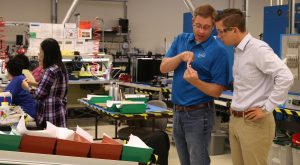Salt Lake City – The Utah Industry Resource Alliance (UIRA) announces its official launch. UIRA provides all Utah manufacturers with a single, expert resource to help them improve their bottom line. UIRA delivers service and outreach to the manufacturing industry in the form of industry-specific training, mentoring and coaching, and becomes a trusted business advisor to its clients.
The manufacturing industry is critical to Utah’s economy. UIRA is a vital economic development organization, chartered specifically to help Utah manufacturers. The Alliance pools the expertise of the University of Utah Manufacturing Extension Partnership (UUMEP), Utah State University’s (USU) Manufacturing Extension Service and their Manufacturing and Outdoor Products SUPPORT HUB, iMpact Utah, Utah Manufacturers Association (UMA), World Trade Center Utah (WTC Utah) and the Utah Advanced Materials and Manufacturing Initiative (UAMMI). This powerful team provides access to manufacturing specialists, application engineers and research professionals from the top organizations and universities in the state.
UIRA delivers industry-centric resources such as process improvement and operational efficiencies, supply chain optimization, revenue growth, leadership development, quality systems and certifications. Available programs include cyber security, organizational excellence, continuous improvement, sustainable practices, technology acceleration, international business development, workforce development, supplier development and topline and bottom-line growth resources, among others. As part of the national Hollings Manufacturing Extension Partnership (MEP), UIRA leverages federal and state resources to support manufacturers even further.
The Alliance is especially critical to the manufacturing industry as they navigate the COVID-19 pandemic. Many manufacturers are seeking out methods to streamline and improve their processes as they face increasing demands.
“Manufacturing is a vital part of the state’s economy,” said Stephen Reed, director of USU’s Utah Manufacturing Extension Service. “It is essential that manufacturers have access to every tool they need to succeed, grow and thrive. Utah Industry Resource Alliance was founded to provide a unified resource for these tools.”
UIRA serves all 29 Utah counties, ensuring manufacturers throughout the state of Utah are supported. Many of their programs can be accessed online, and 29 locations are available state-wide.
For more information about UIRA, visit https://utahira.org/, call (801) 587-0713, or email info@utahira.org.
About Utah Industry Resource Alliance (UIRA)
Utah Industry Resource Alliance is the premier source for assessing needs and providing solutions available through public and private resources. We live and work in communities across the state. Our primary focus is to help Utah’s manufacturers thrive.
Media Contact:
Jenny Haase
Director of Marketing & Relationship Development, iMpact Utah
P: (801) 703-5161 | E: jenny@impactutah.org | W: www.impactutah.org



 problems. The UUMEP Center also facilitated the cultural shift necessary for changes to stick.”
problems. The UUMEP Center also facilitated the cultural shift necessary for changes to stick.” 






 helped establish and run two MEP centers and has a varied background in non-profit management, leadership development and technology-based Economic Development.
helped establish and run two MEP centers and has a varied background in non-profit management, leadership development and technology-based Economic Development.
 and general management. Nigel currently works with the National Institute of Standards and Technology-Manufacturing Extension Partnership program (NIST MEP) working to improve sales performance and operations within its 60 centers nationally and specifically is part of the National ExporTechTM Team as an Export Consultant expanding the ExporTechTM brand, working with 20+ states and more than 250 manufacturers nationwide in their quest to expand global business.
and general management. Nigel currently works with the National Institute of Standards and Technology-Manufacturing Extension Partnership program (NIST MEP) working to improve sales performance and operations within its 60 centers nationally and specifically is part of the National ExporTechTM Team as an Export Consultant expanding the ExporTechTM brand, working with 20+ states and more than 250 manufacturers nationwide in their quest to expand global business.
